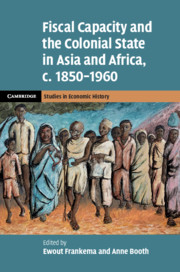Book contents
- Fiscal Capacity and the Colonial State in Asia and Africa, c. 1850–1960
- Cambridge Studies in Economic History
- Fiscal Capacity and the Colonial State in Asia and Africa, c. 1850–1960
- Copyright page
- Contents
- Figures and Maps
- Tables
- Contributors
- Acknowledgements
- 1 Fiscal Capacity and the Colonial State: Lessons from a Comparative Perspective
- 2 Towards a Modern Fiscal State in Southeast Asia, c. 1900–60
- 3 Why Was British India a Limited State?
- 4 Colonial and Indigenous Institutions in the Fiscal Development of French Indochina
- 5 Fiscal Development in Taiwan, Korea and Manchuria: Was Japanese Colonialism Different?
- 6 From Coast to Hinterland: Fiscal Capacity Building in British and French West Africa, c. 1880–1960
- 7 New Colonies, Old Tools: Building Fiscal Systems in East and Central Africa
- 8 Local Conditions and Metropolitan Visions: Fiscal Policies and Practices in Portuguese Africa, c. 1850–1970
- 9 How Mineral Discoveries Shaped the Fiscal System of South Africa
- Index
- References
8 - Local Conditions and Metropolitan Visions: Fiscal Policies and Practices in Portuguese Africa, c. 1850–1970
Published online by Cambridge University Press: 15 November 2019
- Fiscal Capacity and the Colonial State in Asia and Africa, c. 1850–1960
- Cambridge Studies in Economic History
- Fiscal Capacity and the Colonial State in Asia and Africa, c. 1850–1960
- Copyright page
- Contents
- Figures and Maps
- Tables
- Contributors
- Acknowledgements
- 1 Fiscal Capacity and the Colonial State: Lessons from a Comparative Perspective
- 2 Towards a Modern Fiscal State in Southeast Asia, c. 1900–60
- 3 Why Was British India a Limited State?
- 4 Colonial and Indigenous Institutions in the Fiscal Development of French Indochina
- 5 Fiscal Development in Taiwan, Korea and Manchuria: Was Japanese Colonialism Different?
- 6 From Coast to Hinterland: Fiscal Capacity Building in British and French West Africa, c. 1880–1960
- 7 New Colonies, Old Tools: Building Fiscal Systems in East and Central Africa
- 8 Local Conditions and Metropolitan Visions: Fiscal Policies and Practices in Portuguese Africa, c. 1850–1970
- 9 How Mineral Discoveries Shaped the Fiscal System of South Africa
- Index
- References
Summary
This chapter surveys the fiscal policies and practices in the Portuguese African colonies of Mozambique and Angola from the 1850s to 1970s. It explores the fiscal implications of a long history of trade relations and cultural exchange, including early forms of colonial settlement (merchants, missionaries, prazeros), which were moulded into a relatively late and severely contested occupation wave in the late nineteenth century. It discusses the constraints to revenue centralization and fiscal unification and shows how spending policies prioritized security, administration and infrastructure over welfare services. I argue that local conditions, including this specific ‘pre-colonial’ history of Portuguese-African relations, limited possibilities of fiscal modernization, while major ruptures in metropolitan politics (e.g. the Salazar dictatorship) were key in the reorganization of imperial finances.
- Type
- Chapter
- Information
- Publisher: Cambridge University PressPrint publication year: 2019

